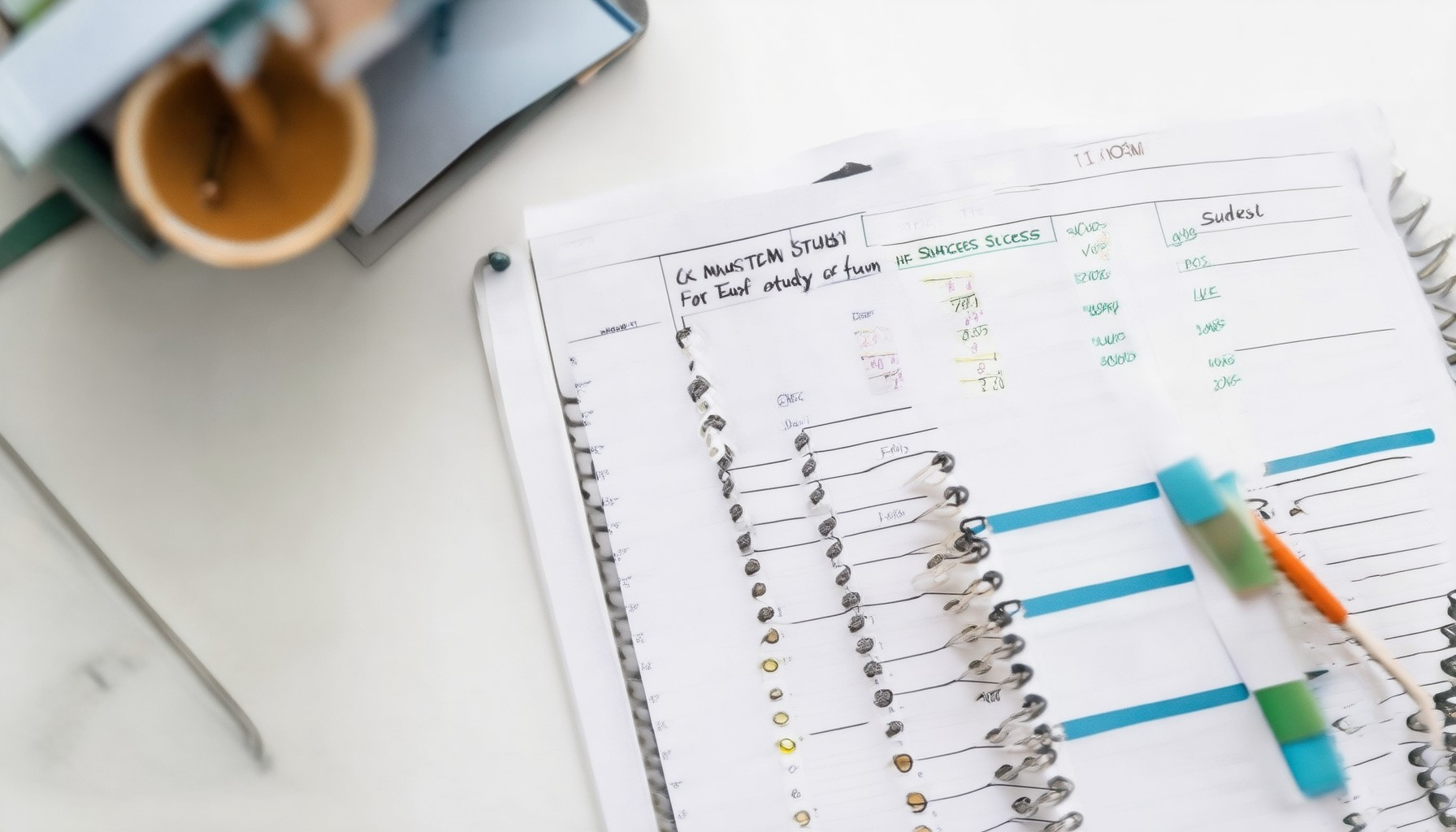Preparing for exams can feel overwhelming, especially when trying to balance schoolwork with other responsibilities. One of the most effective strategies for exam success is creating a well-structured **study schedule for exams**. This guide will walk you through how to design a personalized study plan, manage your time efficiently, and avoid common pitfalls that many students face. Whether you’re juggling multiple subjects or preparing for a high-stakes exam, a consistent and organized approach is key to performing at your best. By understanding the importance of a study schedule, exploring sample timetables, and learning how to plan ahead, you can maximize your productivity and confidence leading up to test day. Let’s dive into the essential tips and insights to help you craft the perfect study routine for exam success.
Key Takeaways
– Effective Study Planning: Crafting a structured study schedule tailored to your strengths and exam requirements is crucial for maximizing efficiency.
– Resource Utilization: Leveraging flashcards, summaries, and practice tests can significantly enhance your learning outcomes.
– Time Management Mastery: Prioritizing key topics and avoiding procrastination ensures optimal use of your study time.
– Health and Well-being: Maintaining adequate sleep, nutrition, and exercise is vital to sustain prolonged study routines and cognitive function.
– Exam Readiness: Prioritizing difficult subjects and practicing past papers helps build confidence and reduces test-day anxiety.
– Balanced Study Habits: Incorporating breaks and using techniques like the Pomodoro method improves focus and prevents burnout.
– Last-Minute Preparation: Reviewing notes systematically, staying calm, and arriving early are key strategies for exam success.
How Many Hours Per Day Should I Study for an Exam?
To maximize effectiveness and minimize burnout, aim to study consistently for 1-2 hours each day. This approach allows for better retention and application of material compared to cramming.
- Consistency is Key: Studying a little each day helps build a routine and ensures you cover all topics without feeling overwhelmed.
- Spaced Repetition: Shorter, frequent study sessions aid in retaining information better than long, intensive ones.
- Active Learning Techniques: Incorporate activities like note-taking, summarization, and problem-solving to enhance understanding.
- Rest and Sleep: Ensure adequate sleep after study sessions to help consolidate learning.
Adjust the duration based on personal availability and subject complexity, but maintain consistency to build effective study habits.
Best Study Schedule: A Comprehensive Guide
Creating an effective study schedule requires careful planning and understanding of your personal rhythm. Here’s a step-by-step guide to designing a study schedule tailored to your needs:
1. Determine Your Daily Commitment
Consistency is crucial, but it shouldn’t overwhelm you. Allocate 2-3 hours daily for studying, spread across different sessions.
Session Breakdown
- Morning Session: 30 minutes before work or school
- Lunch Break: 45 minutes during lunch
- Evening Session: 1 hour post-dinner
2. Assign Time to Subjects
Distribute your study time based on difficulty and strength. Dedicate more time to challenging subjects like math and less time to easier ones like history.
Subject Allocation
- Math: 60 minutes/day
- Science: 40 minutes/day
- History: 40 minutes/day
3. Set Specific Goals for Each Session
Define clear objectives for each study session to maintain focus. For example, spend the first 20 minutes solving algebra problems and then review your progress.
Goal Setting
- Math: Tackle one problem type per session, followed by a 20-minute review
- Essay Writing: Outline essay questions and gather sources beforehand
4. Stay Motivated and Accountable
Use apps or music to stay on track and reward yourself after completing tasks. Remember, it’s okay to have off days—focus on progress, not perfection.
5. Incorporate Physical Activity and Nutrition
Stay hydrated and eat light snacks during study breaks. Take short walks to refresh your mind mid-session.
6. Reflect and Adjust Regularly
After a few weeks, evaluate what’s working and what isn’t. Adjust your schedule as needed, trying new techniques or seeking additional support when necessary.
7. Balance Consistency with Flexibility
Stick to your schedule but remain flexible. Allow room for unexpected changes while maintaining overall consistency.
By following these steps, you’ll create a study schedule that works for you, helping you achieve your academic goals efficiently and effectively.
Best Routine for an Exam
A well-structured routine is essential for excelling during exams. Here’s a comprehensive guide to help you stay organized and perform at your best:
1. Pre-Exam Preparation
- Subject Focus:** Dedicate specific blocks of time to each subject, ensuring thorough coverage of syllabus topics.
- Practice Tests:** Regularly take full-length practice exams under timed conditions to simulate real exam scenarios.
- Mind-Body Health:** Maintain a balanced diet, adequate sleep, and regular exercise to enhance cognitive function and reduce stress.
- Review Key Concepts:** Use reliable resources like Enroll Maven Academy to reinforce weak areas and master critical knowledge.
2. During the Exam
- Read Carefully:** Skim the paper first to identify the number of questions and their weighting. Read each question thoroughly before answering.
- Time Management:** Allocate a specific duration for each question type, prioritizing shorter ones first to secure maximum marks early.
- Pacing:** Work steadily without rushing. Leave difficult questions for the end and return to them if time permits.
- Stay Focused:** Minimize distractions by seating away from others and wearing comfortable, concentrated clothing.
3. Post-Exam Review
- Mistake Analysis:** After finishing the exam, go through your answers to identify errors and understand where improvements are needed.
- Seek Feedback:** Discuss your performance with teachers or mentors to gain insights and adjust your strategy for future exams.
- Celebrate Success:** Acknowledge achievements, no matter the result, and use the experience to motivate further progress.
4. Additional Tips
- Stay Positive:** Maintain a confident mindset, knowing that effort leads to growth regardless of immediate outcomes.
- Utilize Resources:** Leverage online tools and forums, such as Enroll Maven Forum , to connect with peers and share strategies.
- Stay Organized:** Keep track of materials, deadlines, and progress using planners or digital apps to manage responsibilities effectively.
By following this structured approach, you can maximize efficiency and confidence during exam season. Remember, consistent practice and smart planning are keys to long-term academic success.
Is 12 Days Enough to Study for Exams?
Your ability to succeed in exams depends on several factors, including your current knowledge level, study habits, and the complexity of the material. Here’s a breakdown of how you can assess whether 12 days of study is sufficient:
- Time Management and Prior Knowledge: If you have a strong grasp of the subject matter and can efficiently organize your time, 12 days may be enough. However, if you’re starting from scratch or dealing with complex topics, it might be challenging.
- Exam Type and Difficulty: The required study duration also varies by exam type. Standardized tests like SAT or ACT may require less time due to their repetitive nature, while advanced exams like GMAT or GRE may demand more extensive preparation.
- Study Plan and Resources: Developing a structured study plan with clear objectives and utilizing reliable resources can significantly enhance your efficiency. Tools like flashcards, summaries, and practice tests can help consolidate your learning.
- Mental Fatigue and Health: Burnout is a real concern. Ensure you’re getting adequate sleep, eating well, and exercising to maintain cognitive function and energy levels.
Steps to Make the Most of 12 Days
- Create a Study Schedule: Prioritize key topics and allocate specific time slots to each. Focus on high-weightage chapters and practice past papers to identify weak areas.
- Stay Organized: Use flashcards, note-taking apps, or journals to keep track of progress. Regularly review and summarize your notes to reinforce memory.
- Avoid Common Mistakes: Don’t procrastinate and avoid cramming. Start early, take regular breaks, and maintain a healthy balance between studying and relaxation.
Final Thoughts
While 12 days can be sufficient with effective planning and dedication, it ultimately depends on your personal circumstances. Assess your current knowledge level, set realistic goals, and leverage available resources to maximize your chances of success.
For further assistance, explore our comprehensive study guides and exam preparation tools designed to help you excel under pressure.
Is 12 Hours a Day Too Much to Study?
Studying for 12 hours a day can be challenging and may vary depending on individual circumstances, goals, and learning styles. While some individuals may find this level of dedication effective, others may struggle due to burnout or decreased productivity.
Factors to Consider
- Individual Differences: Everyone has unique cognitive abilities and energy levels. Some people thrive under high-pressure study schedules, while others may find it overwhelming.
- Study Efficiency: Productivity varies; focusing for extended periods requires a strong work ethic and effective time management strategies.
- Health Considerations: Prolonged study sessions can lead to fatigue, eye strain, and reduced physical activity, impacting overall health and concentration.
- Learning Style: Different learning styles (e.g., auditory, visual, kinesthetic) may require varied approaches, affecting the effectiveness of consecutive study hours.
Pros and Cons
- Pros:
- Deep immersion in the subject allows for extensive knowledge retention.
- Can be effective for highly motivated and disciplined individuals.
- Cons:
- May lead to burnout, reducing motivation and efficiency over time.
- Risk of neglecting essential tasks like sleep, nutrition, and exercise.
- May hinder social and personal life, leading to stress and anxiety.
Optimizing Study Habits
- Set Realistic Goals: Aim for consistent study times rather than fixed, lengthy sessions.
- Use the Pomodoro Technique: Study for 25 minutes, then take a short break to refresh your mind.
- Incorporate Breaks: Regular breaks during study sessions can improve focus and prevent mental fatigue.
- Stay Organized: Use planners or digital tools to track progress and manage responsibilities effectively.
Alternative Strategies
- Spread Out Studies: Distribute study topics or subjects across different days to maintain engagement and reduce overload.
- Group Study Sessions: Join study groups or collaborate with peers to share workload and ideas.
- Utilize Resources: Leverage available study aids, tutorials, and tools to enhance learning efficiency.
Long-Term Sustainability
- Balance is Key: Maintain a healthy lifestyle with adequate sleep, nutrition, and physical activity to sustain prolonged study routines.
- Monitor Progress: Regularly assess learning outcomes to adjust study strategies and avoid inefficiencies.
- Seek Support: Talk to mentors, teachers, or counselors for guidance and encouragement during challenging periods.
Ultimately, the decision to study for 12 hours a day depends on personal goals, capabilities, and commitment. While it can yield significant results, it’s crucial to balance study with self-care to maintain long-term academic success and overall well-being.
What to Do 2 Hours Before an Exam
Here’s a step-by-step guide to help you prepare effectively:
- Have a Light Meal:** Eat a nutritious, light meal or snack to keep your energy levels steady. Avoid heavy foods that may cause discomfort.
- Stay Hydrated:** Drink water to ensure you’re fully hydrated, as dehydration can affect concentration and mood.
- Review Notes Systematically:** Skim through your notes or study materials one more time, focusing on key topics or areas you find challenging. Take brief practice tests if available to gauge your readiness.
- Create a Study Plan:** Outline the order in which you’ll tackle the exam sections, prioritizing harder subjects first to build confidence and reduce anxiety.
- Stay Calm:** Engage in relaxation techniques like deep breathing exercises or quick meditation sessions to manage stress and maintain focus.
- Dress Comfortably:** Choose clothes that make you feel comfortable and allow you to concentrate without distractions.
- Get Adequate Sleep:** Ensure you’ve had a full night’s rest to be at your best mentally and physically.
- Arrive Early:** Give yourself extra time to arrive early, gather your belongings, and settle into your testing environment.
By following these steps, you’ll be well-prepared and ready to excel on your exam day.









0 Comments